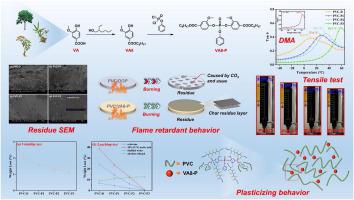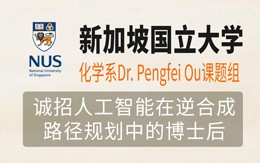Chemical Engineering Journal ( IF 13.3 ) Pub Date : 2023-10-24 , DOI: 10.1016/j.cej.2023.146859
Bingfeng Qian , Weiyao Wang , Huichao Zhu , Jianan Zhang , Mingyuan Wu , Jiuyi Liu , Qingyun Wu , Jianjun Yang

|
The utilization of biobased resources presents a novel approach for the development of high-performance plasticizers with exceptional flexibility. Nevertheless, the combustibility of flexible poly(vinyl chloride) (PVC) products containing high content plasticizers is frequently disregarded. The development of PVC functional plasticizers requires careful consideration of a good balance between flame retardancy, migration resistance and plasticity through molecular structure design. Currently there is a dearth of biobased plasticizers that exhibit exceptional comprehensive properties. Therefore, a novel biobased flame-retardant plasticizer (VA8-P) has been synthesized from vanillic acid and fully characterized using NMR, IR and MS. The VA8-P plasticized PVC exhibits a lower glass transition temperature and higher low temperature resistance, while its elongation at break is 1141.6% higher than unmodified PVC. Transmittance, haze, cross-sectional SEM and 2D/3D AFM all demonstrate its good optical properties and the compatibility of the plasticizer with polymer matrix. PVC plasticized using VA8-P exhibits better hydrophilicity and especially superior migration resistance than does the same polymer plasticized using DOP. The thermal stability and char residue rate for decomposition of VA8-P plasticized PVC are better than the same parameter of material plasticized with DOP. In cone calorimeter tests, VA8-P plasticized PVC showed excellent heat barrier effect. Additionally, PVC-P3 reached the UL-94 VTM-0 level in the vertical burning test. Its flame-retardant mode of action was also verified by TGA–FTIR analysis. A functional biobased plasticizer with excellent comprehensive properties has been synthesized. This material exhibits greater flexibility than many traditional flame-retardant additives and its use can be expected to improve the fire resistance of flexible PVC.
中文翻译:

生物基香草酸聚氯乙烯阻燃增塑剂的合成、表征及性能评价
生物基资源的利用为开发具有卓越灵活性的高性能增塑剂提供了一种新方法。然而,含有高含量增塑剂的柔性聚氯乙烯(PVC)产品的可燃性常常被忽视。PVC功能性增塑剂的开发需要通过分子结构设计仔细考虑阻燃性、耐迁移性和可塑性之间的良好平衡。目前缺乏具有优异综合性能的生物基增塑剂。因此,我们以香草酸为原料合成了一种新型生物基阻燃增塑剂(VA8-P),并使用核磁共振、红外和质谱进行了充分表征。VA8-P增塑PVC具有更低的玻璃化转变温度和更高的耐低温性能,而断裂伸长率比未改性PVC高1141.6%。透过率、雾度、截面SEM和2D/3D AFM均证明了其良好的光学性能以及增塑剂与聚合物基体的相容性。使用VA8-P增塑的PVC比使用DOP增塑的相同聚合物表现出更好的亲水性,尤其是优异的耐迁移性。VA8-P增塑PVC的热稳定性和分解残炭率均优于同参数的DOP增塑材料。在锥形量热仪测试中,VA8-P增塑PVC表现出优异的隔热效果。此外,PVC-P3在垂直燃烧测试中达到了UL-94 VTM-0级别。其阻燃作用模式也通过 TGA-FTIR 分析得到验证。合成了一种综合性能优异的功能性生物基增塑剂。这种材料比许多传统阻燃添加剂表现出更大的灵活性,其使用有望提高柔性 PVC 的阻燃性。































 京公网安备 11010802027423号
京公网安备 11010802027423号